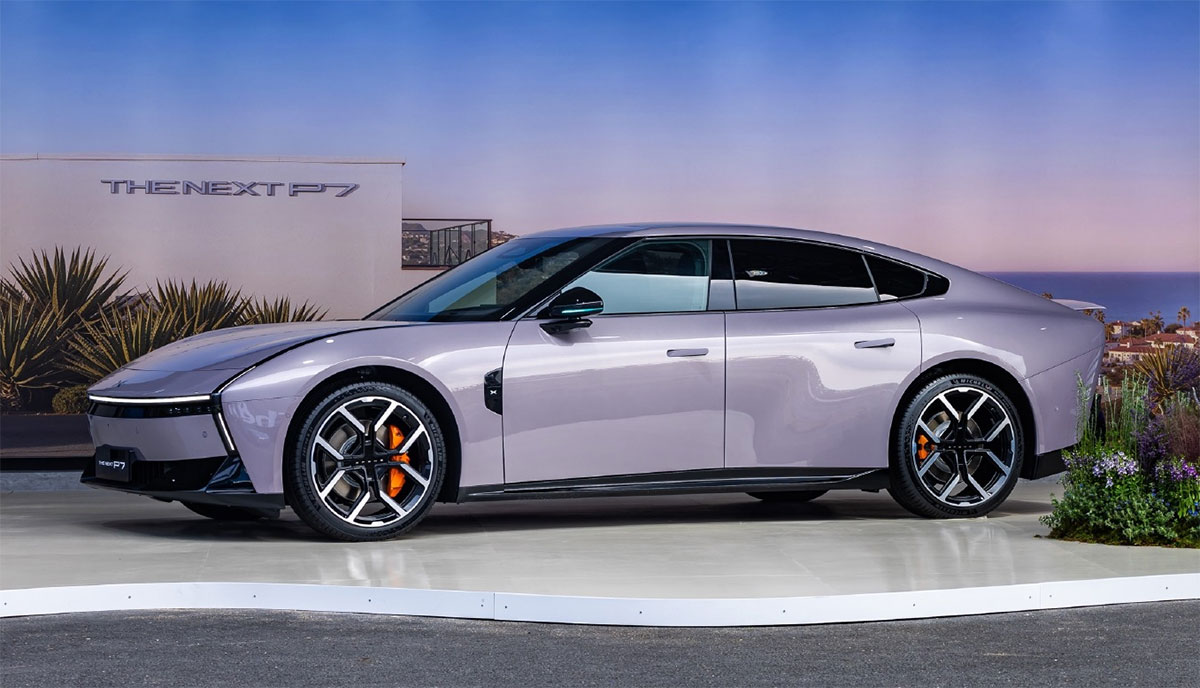Xpeng launches next-gen P7 starting at $30,700, securing 10,000 orders within 7 minutes
The new P7 lineup consists entirely of Ultra versions, each equipped with three Xpeng-developed Turing chips, delivering an effective computing power of 2,250 TOPS.

- The new P7 lineup consists entirely of Ultra versions, each equipped with three Xpeng-developed Turing chips, delivering an effective computing power of 2,250 TOPS.
- Xpeng has radically updated the P7 inside and out, aiming to attract young consumers seeking cutting-edge technologies and fashion.
Xpeng (NYSE: XPEV) has officially launched its next-generation P7, dramatically updating its flagship electric sedan.
The company rolled out the new P7 today at its headquarters in Guangzhou, with a starting price of RMB 219,800 ($30,700), significantly below the previously marketed RMB 300,000 target price point.
Xpeng has radically updated the electric sedan from the outside in, featuring a redesigned exterior style alongside upgrades to the powertrain and smart driving chips.
Shortly after the launch event concluded, Xpeng announced on Weibo that the new-generation P7 secured over 10,000 firm orders within the first seven minutes.
The first-generation Xpeng P7 debuted at the April 2019 Shanghai auto show and was officially launched in April 2020, with deliveries commencing in the middle of 2020.
As Xpeng's first sedan, the P7's sleek design contributed to its strong market performance after launch.
The P7 delivered 60,569 units in 2021 and 59,066 units in 2022, accounting for 61.71 percent and 48.91 percent of Xpeng's annual deliveries respectively, according to data compiled by CnEVPost.
The latest update aims to attract fashion-conscious consumers with a younger, sportier style, following the company's other models that lean more toward the family car market.
Xpeng offers four variants of the new-generation P7, priced starting at RMB 219,800, RMB 239,800, RMB 259,800, and RMB 301,800 respectively.
All four variants are Ultra editions, featuring three of Xpeng's in-house developed Turing AI chips with a combined effective computing power of 2,250 TOPS. Two Turing chips power the smart driving system, while one is used to power cabin services.
This configuration matches the highest-tier Ultra variant of the company's G7 SUV (sport utility vehicle), making the two cars the EV with the highest smart driving computing power to date.
With this computing power, the new P7 supports VLA (Vision-Language-Action) + VLM (Vision-Language Models) large language models.
The VLA model enables the vehicle to think proactively, handling diverse driving scenarios -- such as autonomously determining optimal routes. The VLM model delivers an entirely new intelligent cockpit experience, proactively sensing and providing services.
The new-generation P7 measures 5,017 mm in length, 1,970 mm in width, and 1,427 mm in height, with a wheelbase of 3,008 mm.
Built on an 800-volt high-voltage platform, it features a battery pack supporting 5C charging rates, enabling a 525-kilometer range in just 10 minutes of charging.
The model offers three range options: 702 kilometers, 750 kilometers, and 820 kilometers.
Single-motor and dual-motor configurations are available. The two lower-priced variants feature rear-wheel drive with a single motor, accelerating from 0 to 100 km/h in 5.4 or 5.8 seconds.
The other two variants are dual-motor all-wheel drive models, achieving 0-100 km/h acceleration in 3.7 seconds.
The top-tier variant is the Wing Edition, featuring scissor doors -- a configuration also available on the original P7.
The launch of the new-generation P7 is expected to further boost Xpeng's order volume. In a research note released earlier today, Deutsche Bank projected the company's new order flow for August to reach about 37,000 units.
The bank anticipates Xpeng's August deliveries will hit a record 39,000 units, comprising roughly 36,000 domestic retail deliveries and about 3,000 overseas deliveries.
Xpeng delivered a record 36,717 vehicles in July, marking its ninth consecutive month exceeding 30,000 deliveries since November 2024.
This brings its January-July deliveries to 233,906 units, representing a 270.26 percent year-on-year increase.
($1 = RMB 7.1608)
Disclaimer: The views in this article are from the original Creator and do not represent the views or position of Hawk Insight. The content of the article is for reference, communication and learning only, and does not constitute investment advice. If it involves copyright issues, please contact us for deletion.